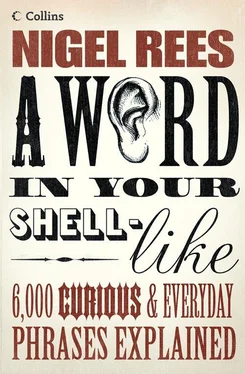and the next object is ---In the radio panel game Twenty Questions , broadcast by the BBC from 1947 to 1976, a mystery voice – most memorably Norman Hackforth’s – would inform listeners in advance about the object the panellists would then try to identify by asking no more than twenty questions. Hackforth would intone in his deep, fruity voice: ‘And the next object is “The odour in the larder” [or some such poser].’
and the next Tonight will be tomorrow night…The stock concluding phrase of the original BBC TV early evening magazine Tonight (1957–65). Cliff Michelmore, who used to say ‘And the next Tonight will be tomorrow night…good night!’, commented (1979): ‘The combined brains of Alasdair Milne, Donald Baverstock, myself and three others were employed to come up with the phrase. There were at least ten others tried and permed. At least we cared…!’
and thereby hangs a taleAs a storytelling device, this is still very much in use to indicate that some tasty titbit is about to be revealed. It occurs a number of times in Shakespeare. In As You Like It , II.vii.28 (1598) Jaques, reporting the words of a motley fool (Touchstone), says: ‘And so from hour to hour, we ripe and ripe, / And then, from hour to hour, we rot and rot: / And thereby hangs a tale.’ Other examples occur in The Merry Wives of Windsor (I.iv.143) and The Taming of the Shrew (IV.i.50). In Othello (III.i.8), the Clown says, ‘O, thereby hangs a tail,’ emphasizing the innuendo that may or may not be present in the other examples.
and there’s more where that came fromCatchphrase from the BBC radio Goon Show (1951–60). This was sometimes said by Major Denis Bloodnok (Peter Sellers) and occasionally by Wallace Greenslade (a BBC staff announcer who, like his senior colleague, John Snagge, was allowed to let his hair down on the show). An example occurs in ‘The Call of the West’ (20 January 1959). The origins of the phrase probably lie in some music-hall comedian’s patter, uttered after a particular joke had gone well. Charles Dickens in Chapter 11 of Martin Chuzzlewit (1843–4) shows that the phrase was established in other contexts first: ‘Mr Jonas filled the young ladies’ glasses, calling on them not to spare it, as they might be certain there was plenty more where that came from.’ Jimmy Cricket, a British comedian, was exclaiming simply, ‘And there’s more !’ by 1986.
and they all lived happily ever afterThe traditional ending to ‘fairy’ tales is not quite so frequently used as ONCE UPON A TIME, but it is present (more or less) in five of The Classic Fairy Tales gathered in their earliest known English forms by Iona and Peter Opie (1974). ‘Jack and the Giants’ ( circa 1760) ends: ‘He and his Lady lived the Residue of their Days in great Joy and Happiness.’ ‘Jack and the Bean-Stalk’ (1807) ends: ‘His mother and he lived together a great many years, and continued always to be very happy.’ A translation of ‘Snow White and the Seven Dwarfs’ by the brothers Grimm (1823) ends: ‘Snowdrop and the prince lived and reigned happily over that land many many years.’ A translation of ‘The Frog-Prince’ ends: ‘They arrived safely, and lived happily a great many years. A Scottish version of ‘Cinderella’ (collected 1878) has: ‘They lived happily all their days.’ The concluding words of Winston Churchill’s My Early Life (1930) are: ‘…September 1908, when I married and lived happily ever afterwards.’
and this is what you doSee MORNING ALL.
and this is where the story really starts…Catchphrase from BBC radio’s The Goon Show (1951–60), usually uttered by the announcer/narrator, Wallace Greenslade, and especially in ‘Dishonoured – Again’ (26 January 1959).
and this too shall pass awayChuck Berry spoke the words of a ‘song’ called ‘Pass Away’ (1979) that told of a Persian king who had had carved the words ‘Even this shall pass away’. George Harrison had earlier called his first (mostly solo) record album ‘All Things Must Pass’ (1970). These musicians were by no means the first people to be drawn to this saying. As Abraham Lincoln explained in an address to the Wisconsin State Agricultural Society (1859): ‘An Eastern monarch once charged his wise men to invent him a sentence to be ever in view, and which should be true and appropriate in all times and situations. They presented him with the words, “And this, too, shall pass away”. How much it expresses! How chastening in the hour of pride! How consoling in the depths of affliction!’ But who was the oriental monarch? Benham (1948) says the phrase was an inscription on a ring – ‘according to an oriental tale’ – and the phrase was given by Solomon to a Sultan who ‘desired that the words should be appropriate at all time’. In 1860, Nathaniel Hawthorne wrote in The Marble Faun of the ‘greatest mortal consolation, which we derive from the transitoriness of all things – from the right of saying, in every conjuncture, “This, too, will pass away”.’
and when did you last see your father?There can be few paintings where the title is as important as (and as well known as) the actual picture. This one was even turned into a tableau at Madame Tussaud’s where it remained until 1989. It was in 1878 that William Frederick Yeames RA first exhibited his painting with this title at the Royal Academy; the original is now in the Walker Art Gallery, Liverpool. The title of the painting has become a kind of joke catchphrase, sometimes used nudgingly and often allusively – as in the title of Christopher Hampton’s 1964 play When Did You Last See My Mother? and the 1986 farce by Ray Galton and John Antrobus, When Did You Last See Your…Trousers? Tom Lubbock writing in the Independent on Sunday (8 November 1992) commented on the fact that the title tends to be remembered wrongly: ‘But the And matters. It turns the title from an abrupt demand into a slyly casual inquiry…[But] the title will probably outlast the image, just as a form of words that rings some distant bell. On green cashpoint screens you now find the query “When did you last update your insurance?” I’m sure the forgotten Yeames is ultimately responsible.’
and with that, I return you to the studio!Catchphrase from the BBC radio show Beyond Our Ken (1958–64). Hugh Paddick played Cecil Snaith, a hush-voiced BBC outside broadcasts commentator. After some disaster in which he had figured, he would give this as the punchline, in a deadpan manner. The show’s host, Kenneth Horne, apparently suggested the line. In its straight form, many TV and radio news reporters use the phrase in live spots even today.
(the) Angel of DeathA nickname bestowed in the Second World War upon Dr Joseph Mengele, the German concentration camp doctor who experimented on inmates – ‘for his power to pick who would live and die in Auschwitz by the wave of his hand’ ( Time Magazine, 17 June 1985). ‘Angel of death’ as an expression for a bringer of ills is not a biblical phrase and does not appear to have arisen until the 18th century. Samuel Johnson used it in The Rambler in 1752.
angels dancing on the head of a pin Benham (1948) went into this thoroughly but did not provide an actual example of what it gives as a head phrase, namely, ‘A company of angels can dance on the point of a needle’. Nevertheless, it glosses the phrase thus: ‘Saying attrib. with variations to St Thomas Aquinas ( circa 1227–74) [who] in Summae Theologiae devotes superabundant space to fanciful conjectures about the nature of angels…“Whether an angel can be in several places at once”…“Whether several angels can be in one place at the same time”…He expends much laboured argument on this and similar problems.’ Correspondents in The Times (20/21 November 1975) seemed to suggest that the attribution to Thomas Aquinas had been mistakenly made by Isaac Disraeli. Mention was made of the 14th-century tractate Swester Katrei – wrongly ascribed to Meister Eckhart – which contains this passage: ‘Doctors declare that in heaven a thousand angels can stand on the point of a needle.’ Mencken (1942) has ‘How many angels can dance upon the point of a needle?’ – ‘ascribed to various medieval theologians, c. 1400.’
Читать дальше












